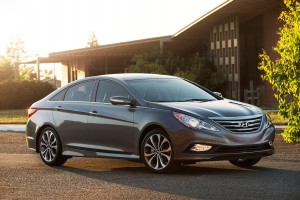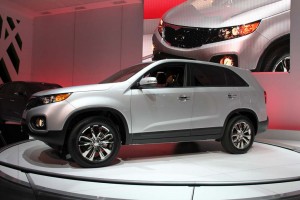U.S. owners of select Hyundai and Kia models filed suit against the automakers in the U.S. trying to resolve a possible defected that may cause some engines to catch fire. The affected vehicles are already part of an ongoing investigation by U.S. regulators.
The more than 350 complaints filed by vehicle owners with the National Highway Traffic Safety Administration constitutes “concealment of the defect,” according to the class action suit filed in U.S. District Court for the Central District Court of California by law firm Hagens Berman.
The fires have been occurring for some time, but have been difficult to separate from fires that occurred as a result of a crash and those that happened before or after a crash. In Florida, more than 400 fires were reported, but just 120 of those fit the description for the lawsuit.
Safety investigators began looking to the problem as a result of those fires, and discovered it could be a much bigger problem. NHTSA started probing the timeliness and scope of the carmakers’ recalls related to manufacturing errors in “Theta II” engines, while the U.S. Attorney’s Office for the Southern District of New York opened a criminal investigation in to the matter, according to a Reuters report.
(Feds probe Hyundai, Kia fire concerns. Click Here for the story.)
Ultimately, Hyundai and Kia have recalled 1.6 million U.S.-made vehicles produced from 2011 and 2014 for engine problems. The customers’ lawsuit argues that a defect restricts oil flow to core engine parts, causing premature wear and failure and eventually resulting in engine seizure and fire.
Hyundai Motor issued a statement saying that “nothing is more important than the safety and security of Hyundai customers,” and that it is cooperating with the U.S. Department of Transportation and the NHTSA.
“Over the past three years, we have held numerous meetings with DOT and NHTSA representatives, and proactively discussed and identified possible safety items for NHTSA’s evaluation, including the engine recalls,” Hyundai Motor said in the statement. “NHTSA has been fully briefed and kept apprised of these recalls and low rates of associated non-collision fires.”
(Click Here for more about Hyundai’s recent management shake up.)
Non-profit consumer advocate group, the Center for Auto Safety, pushed for a much larger action, calling on the Korean companies recall 2.9 million vehicles of five models, arguing that almost one non-collision fire was reported every day over a period of four months.
However, the latest news involves the aforementioned 1.6 million vehicles that were covered by a separate NHTSA probe launched in May 2017 triggered by complaints of engine stalling.
The issue actually dates back to September 2015 when Hyundai recalled 470,000 vehicles because a manufacturing defect could cause bearings in some four-cylinder engines to fail. Hyundai and its sibling Korean brand Kia announced two other recalls affecting 1.2 million vehicles for the same engine problem in March 2017.
(To see more about Hyundai’s expanding line-up of SUVs, Click Here.)
The latest service action covered 2013 and 2014 Hyundai Santa Fe Sport SUVs and Sonata midsize cars, as well as Kia Optima midsize sedans from 2011 through 2014, Kia Sportage SUVs from 2011 through 2013 and Kia Sorento SUVs from 2012 through 2014.


